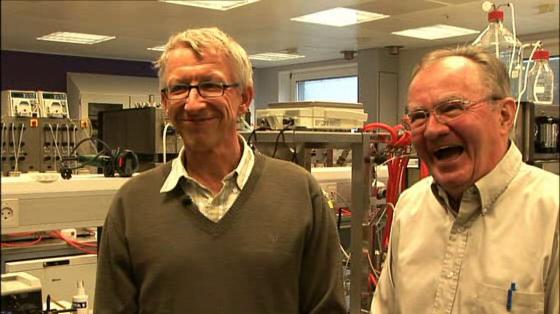Svend Havelund, John Broberg Halstrom, Ib Jonassen, Asser Sloth Andersen, Jan Markussen
Slow-releasing insulin
Diabetes remains a worldwide epidemic. Recent figures are nothing short of alarming, especially regarding children and adolescents in industrialised countries who account for half of new cases of diabetes mellitus. The World Health Organisation (WHO) estimates that more than 180 million people worldwide have the disease, a figure likely to more than double by 2030.
Thanks to Sven Havelund and his team, individuals suffering from diabetes can now enjoy a relatively safe and unencumbered lifestyle - at least in affluent countries. Until recent years, insulin treatments kept diabetics on a tight leash. Patients had to constantly monitor their blood sugar levels and control them through insulin injections several times a day. The new "insulin detemir" which Sven Havelund and his team patented in 2001 gives patients significantly more freedom by controlling blood sugar levels up to 24 hours at a time.
Clinical trials revealed other striking improvements over prior state-of-the-art treatments: insulin detemir has a more predictable, protracted and consistent effect on blood glucose. Hypoglycaemia - a dangerous shortage of blood sugar - is significantly less likely to occur. At the same time, patients are less likely to suffer from weight gains as side-effect of the treatment. This is important because obesity is a major risk factor for type-2 diabetes and also contributes to many of the disease's complications, including circulatory problems.
How it works
Diabetes is a chronic disease that occurs when the pancreas does not produce enough insulin (type 1), or when the body cannot effectively use the insulin it produces (type 2). Injections of insulin, a protein, are the common treatment for managing the disease. The research team at Novo Nordisk aimed to create a new type of insulin that would be slowly released into the bloodstream, offering stable levels of insulin throughout the day, in between meals and at night. To achieve this, the researchers looked at the substance that needs the longest to break down in the human metabolism: fat. In the laboratory, the inventors created the new insulin by binding it to a fatty acid. This modification allows the new insulin detemir to temporarily bind to the blood, thereby providing slow absorption and a prolonged and a consistent metabolic effect of up to 24 hours.
Contact
European Inventor Award and Young Inventors Prize queries:
european-inventor@epo.org Subscribe to the European Inventor Award newsletterMedia-related queries:
Contact our Press team#InventorAward #YoungInventors


